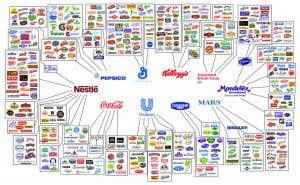Cameron McElmurry’s well written blog post (https://sites.uw.edu/pols385/2020/04/13/a-plague-overlooked-the-locust-crisis-lurking-in-the-shadow-of-covid-19/) discussing the locust crisis occurring in the Horn of Africa gives the reader a look into the world of climate change and how it has increasingly played a role in causing global catastrophes.

In this photo taken Thursday, Jan. 16, 2020, a Samburu boy uses a wooden stick to try to swat a swarm of desert locusts filling the air, as he herds his camel near the village of Sissia, in Samburu county, Kenya. (AP Photo/Patrick Ngugi)
What Cameron and many others neglect to mention is that climate change itself is the by-product of a much larger issue. Although the word ‘neoliberalism’ gets thrown around quite often, the concept still manages to lurk in the shadows of climate change discussions, even though it plays a pivotal role in driving the rising temperature of the planet.
Neoliberalism is often thought of as a neutral force, one that is victim to the ebbs and flow of consumerism, when in reality it is the very force driving these patterns. One of the main tropes we in society are expected to believe is that our consumer choices are a part of our independent thought process, completely driven by our own free will and untainted by the environment which surrounds us. This illusion of choice that neoliberalism has spoon fed Americans in particular, is one of the main reasons why the issue of climate change is often blamed on the consumer. After all, our choices are what drives the demand and if we simply lived more sustainable lives (had gardens in our backyards, shopped at farmers markets, supported small business and overall made more environmentally conscious decisions, etc.), then this whole “global warming” fiasco wouldn’t be happening in the first place, right? This narrative is the blindfold that mass-corporations and governments alike tie neatly around the heads of citizens. Neoliberalism is such an effective deflective force that G20 countries are getting away with spending $88 billion per year subsidizing exploration for new fossil fuels without much more than a slap on the wrist from their citizens (article mentioned in class: https://grist.org/climate-energy/rich-countries-are-still-wasting-billions-on-subsidies-for-fossil-fuels/).

This image is an example of the illusion of choice in consumer brands, particularly in the food system.
Even more alarming is that $88 billion is just what has been invested in finding new fossil fuels. Globally, a whopping $775 billion has been spent in subsidies for the production and use of fossil fuels. As mentioned in the article, these subsidies come in “three basic forms: investment by state-owned enterprises, direct national subsidies and tax breaks, and public finance.” It almost seems as though locusts are not the only pests threatening the livelihoods of people. At the end of the day, if we want to truly work towards a safer future for all inhabitants of the planet, we must un–tie the blindfold neoliberalism has wrapped intricately around the eyes of citizens and expose people to the fuel that truly drives climate change.
Video: https://www.youtube.com/watch?v=u4Y3OEDdpJA this YouTube video highlights some of the overlooked effects of climate change (warning: discusses suicide).

Rolex, wholly Montres Rolex SA, also called (1905–15) Wilsdorf & Davis Ltd. and (1915–20) Rolex Watch Co. Ltd., a Swiss manufacturer of rugged yet luxurious watches. The company’s headquarters are in Geneva.http://www.mywatcheshut.com/
Omega SA is a Swiss luxury watchmaker based in Biel / Bienne, Switzerland. Founded by Louis Brandt in La Chaux-de-Fonds in 1903, the company was originally known as Louis Brandt et Frère – Omega Watch & Co. In 1982, the company officially changed its name to Omega SA, which is currently a subsidiary of the Swiss group Swatch. Omega opened its museum in Biel / Bienne to the public in January 1984.http://www.mywatcheshut.com/
Cartier International SNC, or simply Cartier (/ˈkɑːrtieɪ/; French: [kaʁtje]), is a French luxury goods conglomerate which designs, manufactures, distributes, and sells jewellery, leather goods and watches. Founded by Louis-François Cartier (1819–1904) in Paris in 1847,Crtier operates more than 200 stores in 125 countries, with three Temples (Historical Maisons) in London, New York, and Paris.http://www.mywatcheshut.com/
Breitling SA (German pronunciation: [ˈbraɪtlɪŋ]) is a Swiss luxury watchmaker founded in 1884 in Saint-Imier, Switzerland, by Léon Breitling. The company is known for its precision-made chronometers designed for aviators and is based in Grenchen, Switzerland.http://www.mywatcheshut.com/
Badges and pins have long been cherished as collectible items, often associated with events, organizations, or achievements. They serve as tangible mementos that can be proudly displayed on clothing or bags, showcasing one’s affiliations or interests. Collectors often seek out limited edition or vintage pins and badges, adding to their personal collections with great enthusiasm.http://factorypins.com/
In the realm of shapes and beats, A journey begins, where rhythm meets. With each jump and every slide, Navigate the obstacles, let skill be your guide. Through levels crafted with care and flair, Embrace the geometry dash challenge, if you dare
У 2024 році житель Каліфорнії Брэдлі Буллок став володарем двох величезних виграшів за два дні: спочатку він виграв 2000 доларів у казино, а наступного дня — 10 мільйонів доларів у лотерею https://depo.vn.ua/news/cholovik-z-kaliforniyi-vygrav-u-lotereyu-togo-zh . Це неймовірне поєднання удачі стало темою обговорення в усій спортивній та азартній спільноті. Ця історія нагадує, що азартні ігри та лотереї базуються на випадковості, і хоча шанси на виграш низькі, неймовірні перемоги можливі.
У 2024 році житель Каліфорнії Брэдлі Буллок став володарем двох величезних виграшів за два дні: спочатку він виграв 2000 доларів у казино https://depo.vn.ua/news/cholovik-z-kaliforniyi-vygrav-u-lotereyu-togo-zh, а наступного дня — 10 мільйонів доларів у лотерею. Це неймовірне поєднання удачі стало темою обговорення в усій спортивній та азартній спільноті. Ця історія нагадує, що азартні ігри та лотереї базуються на випадковості, і хоча шанси на виграш низькі, неймовірні перемоги можливі.
У 2024 році житель Каліфорнії Брэдлі Буллок став володарем двох величезних виграшів за два дні: спочатку він виграв 2000 доларів у казиноhttps://depo.vn.ua/news/cholovik-z-kaliforniyi-vygrav-u-lotereyu-togo-zh, а наступного дня — 10 мільйонів доларів у лотерею. Це неймовірне поєднання удачі стало темою обговорення в усій спортивній та азартній спільноті. Ця історія нагадує, що азартні ігри та лотереї базуються на випадковості, і хоча шанси на виграш низькі, неймовірні перемоги можливі.
That’s great. I was impressed by your writing. I am happy to see such a topic. Please come to my blog and read it. my sedgwick
Biodegradable wipes for camping are specially designed for outdoor enthusiasts who prioritize eco-friendliness while on the go. Made from natural, plant-based fibers, these microfiber lens wipes are safe for the environment as they break down quickly after disposal, reducing waste and minimizing harm to natural ecosystems.
Fans of gаmbling with fast payouts greenspin will definitely love it. The platform offers many popular slots, as well as live games with dealers. Cryptocurrency payments are instant, which makes the withdrawal process especially comfortable. Bonuses and promotions are varied, which adds to the excitement. GreenSpin combines convenience, reliability and excellent service.
Do you want to do Tandem Skydiving in Rishikesh, Uttarakhand? If you’re picturing yourself freefalling over the lush landscapes and mighty rivers of Rishikesh, you’re not alone.
Awesome blog. Keep posting. https://phcasinoauthority.com/
Pest Control is an essential service that plays a crucial role in maintaining public health, protecting property, and ensuring a safe living environment. From insects like ants and termites to rodents like mice and rats, pests can cause significant damage to homes, businesses, and agricultural areas if left unchecked.
Lo stile di design unico e l’aspetto iconico degli orologi replica italia lusso li rendono al centro dell’attenzione.
Rolex è uno dei pochi marchi di orologi di fascia alta il cui nome aziendale non è coerente con il nome del fondatore, perché il leggendario nome di Wilsdorf “Rolex” deriva dall’abbreviazione della parola “orologio” (orologio di prestigio), è diventato un orologio di qualità sinonimo di orologi replica rolex. è anche un nome semplice che è facile da pronunciare ovunque e da chiunque.
Thực tế nó là một thông tin hữu ích và tuyệt vời. Tôi rất vui vì bạn chỉ đơn giản chia sẻ thông tin hữu ích này với chúng tôi. Các bạn hãy cập nhật tình hình cho chúng mình nha.
https://www.casinositekim.com/
Cảm ơn vì đã chia sẻ.
Dalla sua fondazione nel 1908 da parte dell’orologiaio della Manifattura Hans Wilsdorf, Rolex non solo è salito più in alto in termini di progresso tecnologico, ma ha anche superato più ostacoli fisici. Dal Rolex Deepsea che si tuffa nelle profondità della Fossa delle Marianne, tag heuer replica al Rolex Explorer che scala la rara atmosfera dell’Everest, al Rolex GMT-Master che sbarca sulla luna: gli orologi Rolex sono ovunque.
is a drug used to improve male function. But abnormal symptoms may occur when taking it. 비아그라구매 This is necessary information for a healthy sexual life and how to respond.
I have been looking for articles on these topics for a long time.
I don’t know how grateful you are for posting on this topic.
Thank you for the numerous articles on this site, I will subscribe to those links in my bookmarks and visit them often.
Have a nice day
제이나인 토토 사이트 도메인
제이나인 토토 사이트 순위
제이나인 토토 유저
제이나인 토토 일정
제이나인 온라인 카지노 순위
https://www.j9korea.com